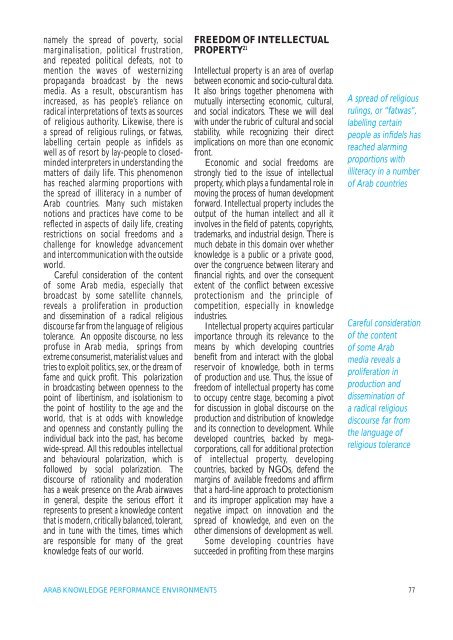Arab Knowledge Report 2009: Towards Productive
Arab Knowledge Report 2009: Towards Productive
Arab Knowledge Report 2009: Towards Productive
- No tags were found...
You also want an ePaper? Increase the reach of your titles
YUMPU automatically turns print PDFs into web optimized ePapers that Google loves.
namely the spread of poverty, socialmarginalisation, political frustration,and repeated political defeats, not tomention the waves of westernizingpropaganda broadcast by the newsmedia. As a result, obscurantism hasincreased, as has people’s reliance onradical interpretations of texts as sourcesof religious authority. Likewise, there isa spread of religious rulings, or fatwas,labelling certain people as infidels aswell as of resort by lay-people to closedmindedinterpreters in understanding thematters of daily life. This phenomenonhas reached alarming proportions withthe spread of illiteracy in a number of<strong>Arab</strong> countries. Many such mistakennotions and practices have come to bereflected in aspects of daily life, creatingrestrictions on social freedoms and achallenge for knowledge advancementand intercommunication with the outsideworld.Careful consideration of the contentof some <strong>Arab</strong> media, especially thatbroadcast by some satellite channels,reveals a proliferation in productionand dissemination of a radical religiousdiscourse far from the language of religioustolerance. An opposite discourse, no lessprofuse in <strong>Arab</strong> media, springs fromextreme consumerist, materialist values andtries to exploit politics, sex, or the dream offame and quick profit. This polarizationin broadcasting between openness to thepoint of libertinism, and isolationism tothe point of hostility to the age and theworld, that is at odds with knowledgeand openness and constantly pulling theindividual back into the past, has becomewide-spread. All this redoubles intellectualand behavioural polarization, which isfollowed by social polarization. Thediscourse of rationality and moderationhas a weak presence on the <strong>Arab</strong> airwavesin general, despite the serious effort itrepresents to present a knowledge contentthat is modern, critically balanced, tolerant,and in tune with the times, times whichare responsible for many of the greatknowledge feats of our world.FREEDOM OF INTELLECTUALPROPERTY 21Intellectual property is an area of overlapbetween economic and socio-cultural data.It also brings together phenomena withmutually intersecting economic, cultural,and social indicators. These we will dealwith under the rubric of cultural and socialstability, while recognizing their directimplications on more than one economicfront.Economic and social freedoms arestrongly tied to the issue of intellectualproperty, which plays a fundamental role inmoving the process of human developmentforward. Intellectual property includes theoutput of the human intellect and all itinvolves in the field of patents, copyrights,trademarks, and industrial design. There ismuch debate in this domain over whetherknowledge is a public or a private good,over the congruence between literary andfinancial rights, and over the consequentextent of the conflict between excessiveprotectionism and the principle ofcompetition, especially in knowledgeindustries.Intellectual property acquires particularimportance through its relevance to themeans by which developing countriesbenefit from and interact with the globalreservoir of knowledge, both in termsof production and use. Thus, the issue offreedom of intellectual property has cometo occupy centre stage, becoming a pivotfor discussion in global discourse on theproduction and distribution of knowledgeand its connection to development. Whiledeveloped countries, backed by megacorporations,call for additional protectionof intellectual property, developingcountries, backed by NGOs, defend themargins of available freedoms and affirmthat a hard-line approach to protectionismand its improper application may have anegative impact on innovation and thespread of knowledge, and even on theother dimensions of development as well.Some developing countries havesucceeded in profiting from these marginsA spread of religiousrulings, or “fatwas”,labelling certainpeople as infidels hasreached alarmingproportions withilliteracy in a numberof <strong>Arab</strong> countriesCareful considerationof the contentof some <strong>Arab</strong>media reveals aproliferation inproduction anddissemination ofa radical religiousdiscourse far fromthe language ofreligious toleranceARAB KNOWLEDGE PERFORMANCE ENVIRONMENTS77
















